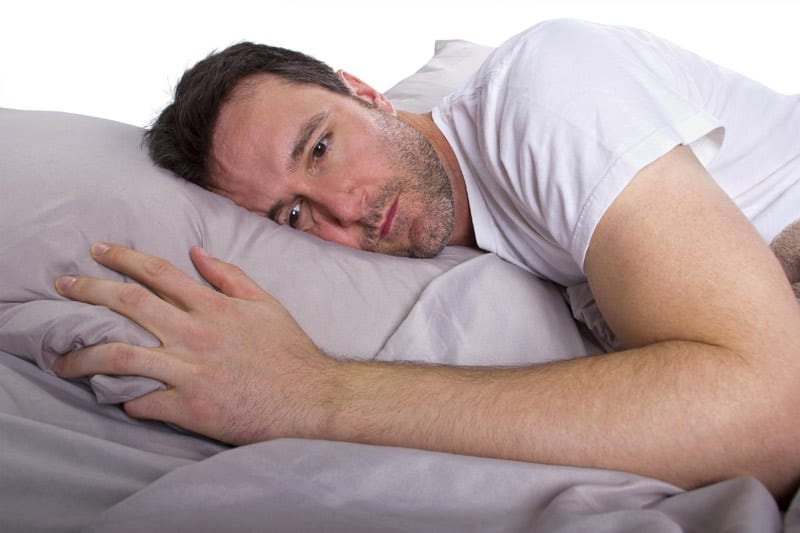Nothing is more frustrating than tossing and turning all night when you should be sleeping. Lying there, anticipating the alarm going off at 6:00 am as the hours tick by, can cause deep distress. You cringe when considering the coming day, knowing that you will be functioning on fumes.
Insomnia is one of the most commonly heard complaints at the doctor’s office, with about 30% of Americans struggling with sleep disturbance, according to the Sleep Foundation. What is not as well understood is the strong connection between insomnia and depression. The co-occurrence of insomnia and depression is so common that doctors are warned not to be swift in diagnosing depression unless insomnia is a presenting symptom.
A groundbreaking epidemiological study, conducted in 1989 with nearly 8,000 participants, was important in quantifying the increase in depression symptoms from one year to the next. It was found that 14% of the participants who reported having insomnia in the first year went on to develop depression by the second year follow up survey. Subsequent studies have further reinforced this association between insomnia and depression. So, with the link between the two so clear, how do you go about treating individuals with co-occurring insomnia and depression?
Best Treatment for Co-occurring Insomnia and Depression
Treatment for depression nearly always includes a combination approach of antidepressant therapy and psychotherapy, namely cognitive behavioral therapy (CBT). However, it has been observed that those with a sleep disturbance like insomnia may not be responsive to CBT long-term. This is because the problematic sleep patterns may endure, leading to relapse back to depression even after successful CBT therapeutic outcomes. In other words, insomnia undermines the CBT treatment success.
That said, there is a form of CBT that is tailored for treating individuals with insomnia. CBT-I is a short-term, goal-directed type of psychotherapy that involves 4-6 sessions. CBT-I may begin with the individual undergoing a sleep study to determine the sleep rhythm and sleep dysfunction present. During the CBT-I therapy, clients are asked to keep a sleep diary that helps them track specific triggers, such as racing thoughts, and to acquire coping skills that help regulate these disruptive thoughts and feelings.
Those who have an enduring issue with sleep disturbance may benefit from a combination of drug therapies, including antidepressants plus a sleep aid from either the benzodiazepine family of drugs or hypnotics like Ambien. Holistic treatments can also provide some measure of relief from the sleep problems. These might include:
- Essential oils have been useful in helping people who experience difficulty sleeping. These oils include lavender, cedarwood, and bergamot. The oils can be massaged into certain points, such as the neck, the wrist, or the feet, or added to a warm bath before bed.
- Meditation is useful in slowly relaxing the muscles and relieving tension. Using apps or YouTube channels as a tool, the individual is guided through a methodical process of releasing stress, allowing him or her to reach a calm place prior to bedtime.
- A full-body relaxation massage can be effective in releasing muscle and joint tension. Adding hot stones or aromatherapy can enhance the relaxing effects of massage.
About Insomnia
Insomnia is a sleep disorder that is characterized by experiencing persistent difficulty in falling asleep or staying asleep, resulting in a lack of adequate quality sleep hours. Deregulation of the circadian cycle, which is the natural rhythm of sleep controlled by the hypothalamus, leads to reduced quality of life. Functioning is impaired when insomnia becomes a sustained problem, as sufferers have difficulty concentrating or lack sufficient energy to perform daily tasks satisfactorily. It can also lead to depression.
Developing insomnia may be a precursor to a subsequent depressive disorder, or it may be a byproduct of existing depression. According to Doctor of Psychology, Bei Bei, Ph.D. from the Monash School of Psychological Sciences in Clayton, Australia, “If a person does not currently have depression but goes through extended periods of time with sleep disturbances or insomnia, the sleep disturbances can potentially contribute to a mood disturbance or to even more severe depression.” On the other hand, the symptoms of depression themselves may cause insomnia to emerge as a prominent feature. Either disorder can give rise to the other.
There are other causes of insomnia besides depression. An anxiety disorder can cause insomnia, as can chronic pain, sleep apnea, or even some medications. Emotional strife is another common cause of insomnia, such as experiencing the loss of a loved one, losing a job, divorce, or financial worries. Substances, such as nicotine and caffeine, can also cause disrupted sleep. It is also important to note that individuals struggling with depression might experience hypersomnia, or excessive sleeping, or a combination of each.
About Depression
Depression is a serious and complex mental health disorder that affects over 17 million Americans annually. Symptoms range from mild to severe, with some individuals suffering debilitating symptoms that seriously impair daily functioning.
Treatment for major depressive disorder involves an integrated program that includes both traditional evidence-based therapies and medication, as well as holistic and experiential activities that enhance the effects of psychotherapy. Depression can definitely be successfully treated and managed with the right combination of interventions.
To diagnose depressive disorder, the mental health provider will first rule out any medical problem before pursuing psychiatric interventions. This is because there are several health conditions that can cause depression-like symptoms, including diabetes, cancer, multiple sclerosis, Alzheimer’s, and pulmonary conditions like COPD.
The DSM-5 has listed specific symptoms associated with depressive disorder and stipulates that a cluster of 5 or more symptoms that persist for more than two weeks must be present for a diagnosis. These symptoms include:
- Sadness that persists for most of the time
- Loss of interest in pleasure or activities once enjoyed
- Mood swings
- Feelings of guilt or shame
- Feelings of hopelessness or despair
- Slowed cognitive and motor functions
- Sudden weight gain or loss
- Sleep disturbances, such as insomnia or hypersomnia
- Irritability
- Unable to concentrate or make decisions
- Thoughts of suicide
In addition to these classic diagnostic criteria, depression can also cause other symptoms. These might include skin problems, back pain, stomach distress, and headache.
When diagnosing someone, the psychiatrist may also use screening tools to help in diagnosing the depression, such as the Hamilton Depression Rating Scale (HAM-D) or the Patient Health Questionnaire (PHQ-9). These can assist in getting a more accurate diagnosis, as there are several subtypes of depression, which have different features. In addition to major depressive disorder, the other types of depression include:
- Also termed persistent depressive disorder, featuring milder symptoms of depression that last two years or longer.
- Seasonal affective disorder. Depressed mood resulting from decreased exposure to sunlight and vitamin D that causes social withdrawal, fatigue, hopelessness, hypersomnia, and mood swings.
- Psychotic depression. The individual with depression may experience delusional thoughts or hallucinations in addition to the symptoms of depression
- Postpartum depression. Affects 10-15% of new mothers and features irritability, difficulty bonding with the newborn, feelings of inadequacy, insomnia, mood swings, and thoughts of harming baby or self
- Premenstrual dysphoric disorder. A severe form of PMS that features extreme mood swings, sadness, irritability, and anger.
- Bipolar depression. The depressive episodes that alternate with manic episodes in individuals with bipolar disorder.
The Importance of Managing Insomnia for Successful Depression Treatment
The complex relationship between depression and insomnia creates treatment challenges. However, treatment of the depression will depend in great part on the successful management of the symptomatic insomnia. If the ongoing insomnia is not addressed, treatment will be undermined, and depression relapse would be likely. Living with the effects of insomnia is distressing, with daily life being negatively impacted and potentially triggering the depression again.
Adequately managing the insomnia necessitates a comprehensive view of the problem. Many times, individuals with insomnia will develop poor sleep habits that only exacerbate the problem. These might include such things as not sticking to a routine sleep schedule, or going to bed while continuing to use a smartphone or laptop that emits blue light as well as keeping the mind in an active or agitated state. Other habits that undermine quality sleep include drinking alcohol, consuming too much caffeine, engaging in exercise later in the evening, or eating a heavy meal late at night.
When chronic insomnia has led to depression, or if a predominant symptom of your depression happens to be insomnia, it is essential to reach out to a mental health professional. Insomnia is a serious problem that intensifies the depression, which can increase the risk for suicide. If the symptoms of insomnia and depression are not improving after several months of therapy, consider the next level of mental health support, a residential treatment program. Residential programs are an excellent option for individuals in need of more customized treatment interventions within a safe, supportive therapeutic environment.
If you or someone you know experiences mental health issues, it is important to seek help from a qualified professional. Our Resource Specialist can help you find expert mental health resources to recover in your community. Contact us now for more information on this free service to our users.
About the Author
Steven Booth is the CEO and Founder of Elevation Behavioral Health in Agoura Hills, California. Steven earned his B.A. from the University of California, Santa Barbara in Economics. Before helping to co-found Elevation Behavioral Health, Steven worked in both private and public accounting. Like many others, Steven has seen firsthand the destruction that addiction can inflict on family and friends. He has also witnessed the extraordinary changes that can be made when addicts receive the necessary treatment. His passion is providing outstanding mental health care through his facility, and improving the quality of life of clients.
Image Licensed by Adobe Stock
The opinions and views expressed in any guest blog post do not necessarily reflect those of www.rtor.org or its sponsor, Laurel House, Inc. The author and www.rtor.org have no affiliations with any products or services mentioned in the article or linked to therein. Guest Authors may have affiliations to products mentioned or linked to in their author bios only.
Recommended for You
- Reclaiming Your Future: Effective Strategies for Addiction Recovery - March 26, 2025
- Coping With Social Anxiety In School: Strategies For Success - March 24, 2025
- Overcoming Trauma and Living with Depression: A Journey of Healing - March 20, 2025





